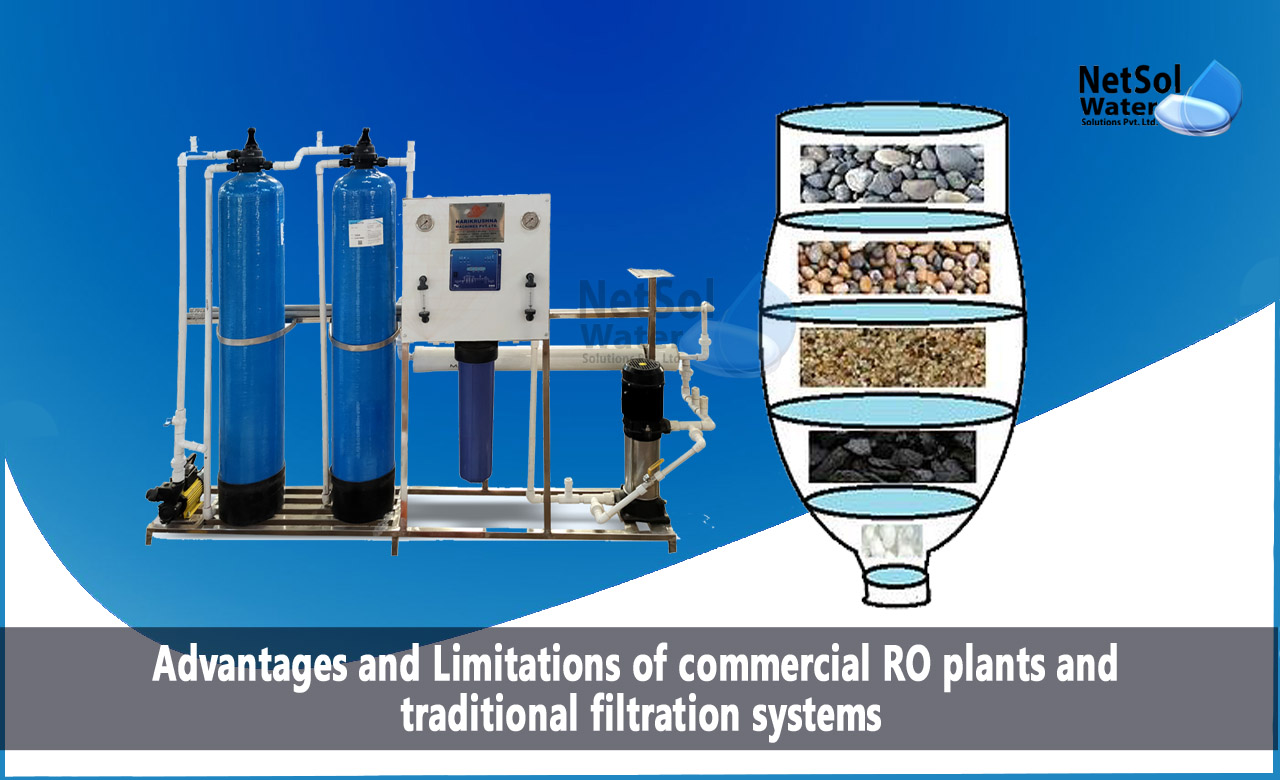Commercial RO plants vs traditional filtration systems
Water filtration systems are essential for ensuring access to clean and safe drinking water. When it comes to large-scale applications, commercial reverse osmosis (RO) plants and traditional filtration systems are the primary contenders.
Here we will compare and evaluate the advantages and limitations of commercial RO plants and traditional filtration systems to determine which one reigns supreme in terms of efficiency, effectiveness, and overall performance.
Understanding Traditional Filtration Systems
Traditional filtration systems typically involve the use of media-based filters, such as sand, carbon, or multimedia filters. These filters work by physically straining out impurities and contaminants present in the water. They are effective in removing sediments, particulates, and some organic matter. However, they may not be as efficient in removing dissolved solids, bacteria, viruses, and certain chemicals.
The Power of Reverse Osmosis Technology
Commercial RO plants employ advanced reverse osmosis technology to purify water. This process involves forcing water through a semi-permeable membrane under high pressure, effectively removing impurities, dissolved solids, bacteria, viruses, and harmful substances. RO technology is highly efficient in producing clean and safe drinking water that meets stringent quality standards.
Efficiency and Water Recovery
One of the key differentiating factors between commercial RO plants and traditional filtration systems is their efficiency in water usage. Traditional filtration systems can have lower water recovery rates, meaning that a significant amount of water may be wasted during the filtration process. In contrast, commercial RO plants have higher water recovery rates, often exceeding 70%, making them more efficient in water usage and reducing wastage.
Removal of Impurities and Contaminants
When it comes to removing impurities and contaminants, commercial RO plants have a clear advantage over traditional filtration systems. RO technology can effectively remove dissolved solids, heavy metals, bacteria, viruses, and many types of organic and inorganic contaminants. Traditional filtration systems, while capable of removing some impurities and sediments, may not be as effective in eliminating dissolved contaminants and microorganisms.
Water Quality and Safety
Commercial RO plants consistently produce water of high quality and safety. The semi-permeable membrane in RO systems acts as a barrier, allowing only pure water molecules to pass through while blocking impurities. This results in water that meets stringent quality standards and is free from contaminants. Traditional filtration systems can provide adequate water quality for certain applications but may not achieve the same level of purity as commercial RO plants.
Scalability and Application Flexibility
Commercial RO plants offer scalability and flexibility in meeting diverse water treatment needs. They can be customized and expanded to accommodate different flow rates and volumes, making them suitable for various applications, from small communities to large industrial operations. Traditional filtration systems, while effective on a smaller scale, may face limitations in scalability and adaptability to higher water demands.
Maintenance and Operational Considerations
Both commercial RO plants and traditional filtration systems require regular maintenance and operational considerations. However, commercial RO plants often have more sophisticated monitoring and control systems, allowing for efficient operation and troubleshooting. They may also require periodic membrane cleaning or replacement. Traditional filtration systems generally have simpler maintenance requirements but may need more frequent filter replacements and monitoring to ensure optimal performance.
Summary:
While both commercial RO plants and traditional filtration systems have their merits, commercial RO plants reign supreme when it comes to efficiency, effectiveness, and overall performance in large-scale water treatment. With their advanced reverse osmosis technology, high water recovery rates, and superior removal of impurities and contaminants, commercial RO plants provide a reliable and efficient solution for producing clean and safe drinking water. Their scalability, application flexibility, and ability to meet stringent quality standards make them the preferred choice for various industries and communities worldwide.
Leading manufacturer of sewage treatment plants in India.
Netsol Water Solutions is the leading manufacturer, supplier, and exporter of a quality selection of water treatment, and wastewater treatment products in India, by using advanced sewage treatment methods.
RO plants, water softeners, ETPs, STPs, DM plants, AMC, O&M, Ultra filtration, UV, Ozonation, ZLD plants, Anoxic tanks, and other goods and services are available from us. We also provide services to businesses in sectors including automotive, pharmaceutical, textile, pulp & paper, beverages, refineries, schools, hospitals, office buildings, and hotels, among others.
Netsol Water is Greater Noida-based leading water & wastewater treatment plant manufacturer. We are industry's most demanding company based on client review and work quality. We are known as best commercial RO plant manufacturers, industrial RO plant manufacturer, sewage treatment plant manufacturer, Water Softener Plant Manufacturers and effluent treatment plant manufacturers. Apart from this 24x7 customer support is our USP. Call on +91-9650608473, or write us at enquiry@netsolwater.com for any support, inquiry or product-purchase related query.



